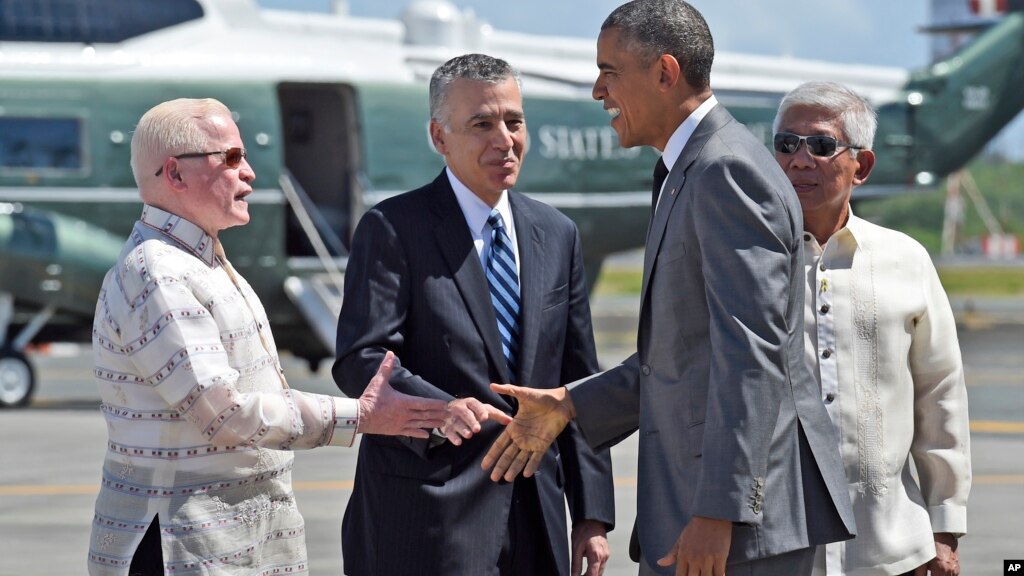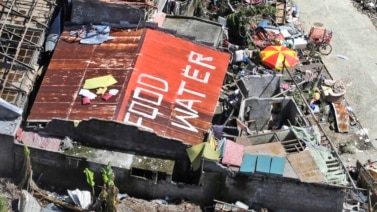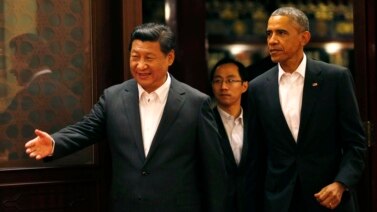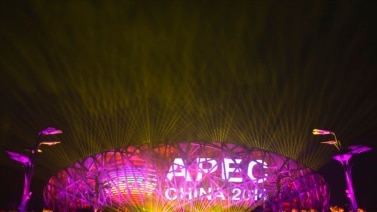
U.S. President Barack Obama promised Tuesday to help America’s allies in East Asia and the Pacific increase their maritime security.
The president made the offer as part of talks with Asia-Pacific leaders in the Philippine capital, Manila.
The leaders of 21 economies and other heads of state are taking part in the Asia-Pacific Economic Cooperation, or APEC, summit this week. The meetings take place on Wednesday and Thursday.
Mr. Obama said his visit shows “our shared commitment to the security of the waters of this region and to the freedom of navigation.”
The Obama administration said it would give Asia-Pacific allies up to $259 million in new aid over two years. The Philippines will receive $79 million; Vietnam, $40 million; Indonesia, $21 million; and Malaysia, $2.5 million.
The U.S. will also give a Coast Guard cutter and a research ship to the Philippines.
Soon after President Obama arrived in Manila Tuesday, he visited the Philippines’s naval flagship, the BRP Gregario del Pilar. It once belonged to the U.S. Coast Guard. The ship now carries out anti-terrorism operations and sails through disputed waters in the South China Sea.
China has made claims to some islands in the area. The claims have increased tensions with neighboring countries.
The president said “more capable navies and partnership with the United States are critical to the security” of the area.
The Obama administration said U.S. officials will talk mostly about trade during the APEC summit. But they said officials will also talk about ways to fight Islamic State militants. The group claimed responsibility for deadly attacks in Paris last week.
Mr. Obama spoke about the fight against the Islamic State at talks with Australia’s prime minister, Malcolm Turnbull. Mr. Turnbull said his country will continue to support “the United States and our allies in the fight against this type of extremist violence, this type of terrorism.” Mr. Obama noted that Australia is the “second-largest contributor to the counter-ISIL coalition.”
Mr. Obama planned to urge APEC countries to support the Trans-Pacific Partnership agreement. It is an important part of the administration’s effort to place more importance on the Asia-Pacific area.
The administration notes that the area is home to hundreds of millions of people and is developing quickly. It says the United States must become more involved in the area.
Before the summit, Mr. Obama said “if we’re going to continue to succeed in securing our nation and our allies, then we’re going to have to be a player and help establish the economic and security architecture in that region for this century and the centuries to come.”
The president has urged lawmakers in the 12 nations covered under the TPP agreement to approve the deal.
Many members of the U.S. Congress oppose the agreement. They say it does not protect American workers and interests enough. But the Obama administration says the agreement is good for American businesses, workers and national security.
During his time in Manila, Mr. Obama will meet with the leaders of Australia, Canada, Japan, the Philippines, Singapore and Malaysia. They are expected to discuss the TPP, terrorism and other issues, including cyber-security, maritime security, climate change and human rights.
I’m Christopher Jones-Cruise.
VOA’s Mary Alice Salinas and Brian Padden reported this story from Manila. Chris Hannas contributed to this report from Washington. Christopher Jones-Cruise adapted it for Learning English. George Grow was the editor.
We want to hear from you. Write to us in the Comments Section, or visit our Facebook page.
Words in This Story
maritime – adj. of, or relating to, sailing on the sea or doing business (such as trading) by sea
region – n. a part of a country or the world that is different from other areas
navigation – n. shipping; the act of moving in a boat or ship over an area of water
cutter – n. a small military ship
capable – adj. skilled at doing something; able to do something well
contributor – n. someone who gives something to help a person, group, cause or organization
player – idiomatic expression. a person, country or organization that has influence in a particular area or activity
architecture – informal/idiomatic structure


